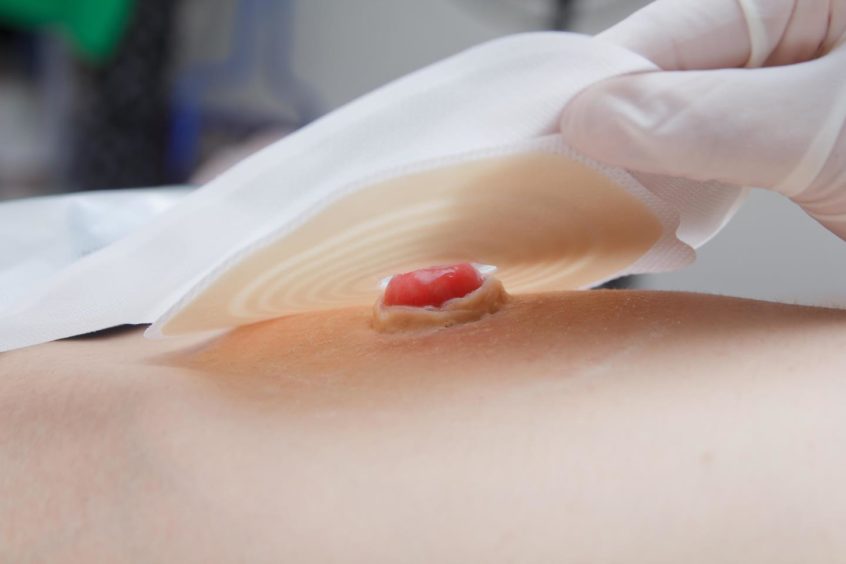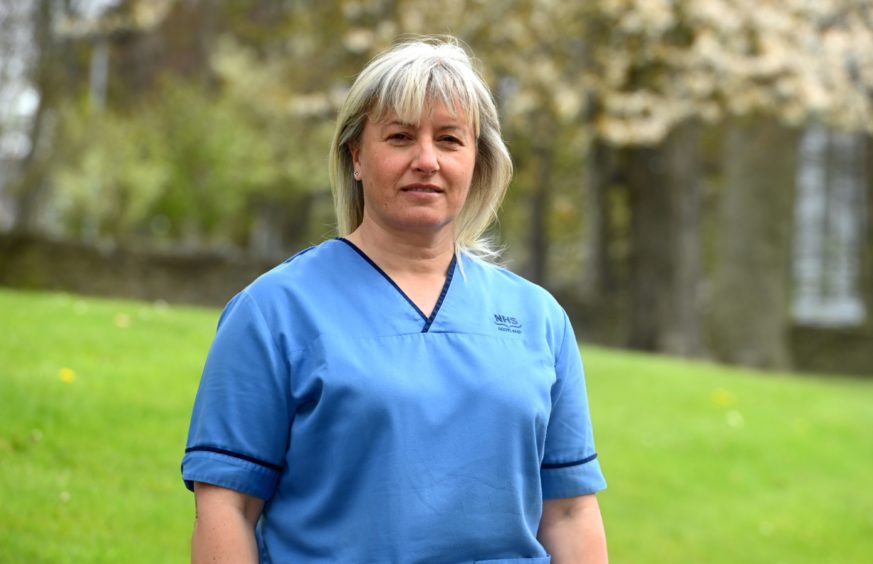To raise awareness on World Inflammatory Bowel Disease Day, Samantha Leckie spoke to IBD specialists, as well as north-east people living with the illness, who have bravely chosen to speak about their symptoms, and the ripple effect the disease has had on their lives.
Inflammatory Bowel Disease is chronic, lifelong and cruel… yet it’s an illness many people don’t know much about.
More than 500,000 people in the UK suffer with the debilitating and, at times, humiliating condition.
Surprisingly, despite so many people being diagnosed with IBD every single day, concrete research around the disease is few and far between. There’s still much speculation around why more and more people are suffering from Ulcerative Colitis or Crohn’s Disease – the two conditions which come under the umbrella term of IBD.
The illness is unpredictable. It’s unclear if people are born with a genetic predisposition, but some things are certain; the disease can strike at any age, medication is limited, surgery can be life-saving, and as for a cure, it just doesn’t exist.
Breaking the ‘poo taboo’ surrounding Inflammatory Bowel Disease
Symptoms of Inflammatory Bowel Disease, such as diarrhea, incontinence and rectal bleeding, can all be embarrassing to talk about.
Who really wants to talk about their poo? The fear is often referred to as the poo taboo – and in today’s society it really does exist.
The anxiety surrounding poo taboo is only made worse if you’re suffering from symptoms like those caused by Inflammatory Bowel Disease.
It’s a fear which stops many people going to their GP to have their symptoms diagnosed. The embarrassment and feeling of shame can be crippling. But a change in bowel habits should never be ignored. After all, everyone has to poo.
Today, Debbie Muirhead of Aberdeen, Jamie McLeish – who lives in Cheshire but is originally from Aberdeen, Sascha Brown of Tarland, Sarah Anderson from Aberdeen and Portlethen’s Calum Spence, are bravely choosing to break the poo taboo in a bid to raise awareness of IBD.
All five IBD warriors know only too well how distressing the symptoms of Inflammatory Bowel Disease can be.
From a diagnosis at the tender age of 10, to being struck down with symptoms completely out-of-the-blue at 38 years old – they all have their own individual journeys with IBD to tell.
Each of them have decided to speak openly about their symptoms and experiences living with Inflammatory Bowel Disease not only to raise awareness, but to hopefully help others suffering the same fate.
They show that Inflammatory Bowel Disease does not have to define a person’s life. They are all IBD warriors – yes. But there is also so much more to their lives too, despite their battles with the chronic illness.
Click an image below to hear each person explain their unique journey with Inflammatory Bowel Disease.
This graphic is best viewed on a desktop PC
The psychological effect of Inflammatory Bowel Disease
“Inflammatory Bowel Disease is very unpredictable. It hugely impacts a person’s life, and then impacts that person’s family, their spouses. So, yes, it’s happening to that person, but there’s a much bigger picture there,” explains Jennifer Robb, an IBD specialist nurse at Aberdeen Royal Infirmary.
Alongside her colleagues, Jennifer provides essential advice, dedicated support and vital treatments to patients living with Ulcerative Colitis or Crohn’s Disease.
“People put up with a lot before they get to the point of phoning us for help,” said Jennifer, who finds that patients are either used to living in pain, or are terrified to ask for help to manage their symptoms in case surgery is the only option.
“Sometimes we have patients phoning so upset because they can’t even take their children to school – they don’t know if they’ll be able to make the 10 minute journey in the car without needing the toilet desperately or having an accident.
“We’ve even had patients who’ve lost jobs because they’ve been unwell and employers just haven’t understood what it’s like to live with IBD.
“There’s a whole psychological effect of Inflammatory Bowel Disease. It can be quite traumatic to listen to and it can be hard to hear of people missing out on normal life.”
Treatment for Inflammatory Bowel Disease – it’s limited
“For as huge a problem as IBD is, yes we have a few treatments we can offer, but only four. Four sounds better than none but it’s not a huge amount. Especially when you have a large number of young patients coming through,” Jennifer, who has worked as an IBD specialist nurse for 13 years, said.
Although Inflammatory Bowel Disease effects the bowel, as the name suggests, the problem in fact lies with a person’s immune system. A properly functioning immune system attacks foreign threats to the body, such as viruses or bacteria. However, in IBD, it’s believed the immune system incorrectly triggers and causes inflammation in the gastrointestinal tract.
Medications offered for IBD work to reduce inflammation, and in stronger treatment options, to suppress the body’s malfunctioning immune system. While this may work to reduce symptoms for a period of time, all too often the immune system finds a way to fight back. This leaves patients seeking new treatments once more.
Jennifer explained it is particularly hard if a patient is diagnosed at a young age, she said: “One treatment might keep a young person well for a couple of years, but then it can stop working as the immune system fights the medication.
“So they move onto the next medication. Four treatments are not going to keep them going their whole lives.
“Ultimately, surgery might come into play and that’s huge.”
Surgery is “by no means the end of the world”
“Only a proportion of people will end up needing surgery, if all else fails,” added Dr Malcolm Smith, a consultant gastroenterologist at Aberdeen Royal Infirmary.
“The turning point for surgery varies. Some people present well and we get the chance to try medication as a treatment, but if their clinical condition is deteriorating quite rapidly then surgery is a safer option.”
To relieve the symptoms of Inflammatory Bowel Disease, ostomy surgery to create a stoma may be the only way forward if medication fails to provide a better quality of life.
What does ostomy surgery involve?
Ileostomy – this is when the large bowel is either removed or allowed to heal before being joined back up together. Part of the small bowel – either the end or a looped portion – is pulled through an incision made in the stomach. This forms a stoma.
Colostomy – this involves pulling part of the large intestine (colon) through an incision in the abdomen to create a stoma. Like an ileostomy, it either involves the end or a loop of the colon.
Proctectomy – a stoma is made permanent when this surgery is performed. It involves removing the rectum and the anus. When the anus is removed that area of the body is surgically closed up (commonly known as a Barbie butt).
“Most of my patients who have stoma surgery after having had IBD for a long time think it’s the best decision they’ve ever made,” said Dr Smith.
“Having a stoma can be life altering, but also life saving. There’s a high chance they wouldn’t be here if they didn’t have surgery.
What is a stoma?

A stoma is an opening in the stomach, created during surgery, that is connected to either the digestive or urinary system.
The stoma allows waste (faeces) to leave the body and is small, red or pink and may be an oval or circular shape.
It has no nerve endings so a person cannot feel or control the waste. A pouch is worn over the stoma to collect the waste.
“We always say to our patients we’d rather have them here with a stoma, than not here at all… we have unfortunately lost some patients.
“Having a stoma is a huge psychological change, but it is by no means the end of the world.”
Seeking a cure for Inflammatory Bowel Disease
Despite being a condition which affects so many, currently there is no known cure for Inflammatory Bowel Disease. And according to Dr Smith, it could be quite some time before a cure is even discovered.
“There’s still a lot of unknowns around IBD,” he said. “It’s complicated. I’d like to think there may be a cure in my lifetime, but I do think we are some way off.”
He added: “There is some work going on with some genetic panels which you can test for. Some people are saying it’s a possibility they might be able to identify people at a higher risk of IBD, but this is in the very early stages.
“In the future, hopefully there will be access to a genetic test, which may or may not say if someone is going to develop Inflammatory Bowel Disease.
“It might be able to give us a clearer view of what treatment is needed for that patient, and if we need to step in with more aggressive treatments sooner.
“We do think people probably have a predisposition to having IBD because people have some genes that are more common, but interestingly not everyone with IBD do have the same genes.
“Right now, there isn’t a straight forward genetic test which says, ‘yes you will get Inflammatory Bowel Disease at some point’ or ‘no you won’t get it’.”
Offering a glimmer of hope for the future, Dr Smith pointed out: “You do just need one discovery in medicine to find a ground-breaking cure. It just takes one.”
Crohn’s & Colitis UK provide information and support for Inflammatory Bowel Disease.


